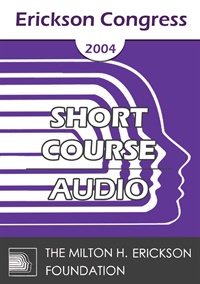
- Average Rating:
- Not yet rated
- Topic Areas:
- Short Courses | Brief Therapy | Relationships | Therapist Development
- Categories:
- Erickson Congress | Erickson Congress 2004
- Faculty:
- Susan Dowell, MSW
- Duration:
- 1:19:45
- Format:
- Audio Only
- Original Program Date:
- Dec 02, 2004
- Short Description:
- We are often of many minds as we approach the interactions, decisions and crisis of our daily lives. By utilizing the intriguing language of the computer world, we will learn how to identify and enhance awareness of the many selves we inhabit and to recognize their internal relationships with each other. We will also learn strategies for using these concepts to activate and facilitate. This workshop will be experiential with a didactic introduction and discussion.
- Price:
- $15.00 - Base Price
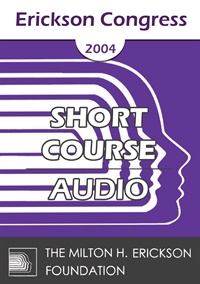
- Average Rating:
- Not yet rated
- Topic Areas:
- Short Courses | Mind-Body | Trauma | Brief Therapy | Ericksonian Hypnosis and Therapy Techniques | Trance | Hypnotic Induction | Pain and Healing | Hypnosis
- Categories:
- Erickson Congress | Erickson Congress 2004
- Faculty:
- Ronald Alexander, PhD | Anita Jung, M.S.
- Duration:
- 1:19:45
- Format:
- Audio Only
- Original Program Date:
- Dec 02, 2004
- Short Description:
- This workshop will address the rapid treatment of trauma and psychosomatic disorders by utilizing an Ericksonian orientation that understands the importance of the symptom as a pathway to inner healing. The skills needed for the rapid treatment of trauma will be reviewed. The course will highlight Ericksonian methods for the immediate reorganization of transforming somatic-affective experience into new healing rhythms in the body.
- Price:
- $15.00 - Base Price
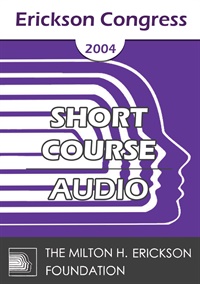
- Average Rating:
- Not yet rated
- Topic Areas:
- Short Courses | Psychotherapy | Brief Therapy | Therapist Development
- Categories:
- Erickson Congress | Erickson Congress 2004
- Faculty:
- Chris Gunn, PhD
- Duration:
- 1:19:37
- Format:
- Audio Only
- Original Program Date:
- Dec 02, 2004
- Short Description:
- "Paradox" is a frequently used term, but less frequently understood and effectively used in brief therapy. This dynamic and light-hearted presentation will borrow Weber's widely accepted construct of Just Noticeable Difference to make the case for Erickson's "tipping the first domino" with pattern analysis and paradoxical intervention. This approach to psychotherapy will be demonstrated and discussed using case examples from the presenter and the participants.
- Price:
- $15.00 - Base Price

- Average Rating:
- Not yet rated
- Topic Areas:
- Short Courses | Psychology | Psychotherapy | Belief Systems | Brief Therapy | Social Issues | Ericksonian Hypnosis and Therapy Techniques | Multicultural
- Categories:
- Erickson Congress | Erickson Congress 2004
- Faculty:
- Naji Abi-Hashem, PhD
- Duration:
- 1:19:45
- Format:
- Audio Only
- Original Program Date:
- Dec 02, 2004
- Short Description:
- What are the causes of fundamentalism and militant behavior? Can we clearly understand or define terrorism? This presentation will examine the root causes of radicalism and religious militancy and will explore how Milton Erickson would have dealt with these emerging and recent phenomena. We will attempt to address these sensitive, timely matters through open discussion among participants and analyze the psychosocial nature of terrorism and its impact on people.
- Price:
- $15.00 - Base Price

- Average Rating:
- Not yet rated
- Topic Areas:
- Short Courses | Brief Therapy | Cancer | Meditation, Spirituality and Yoga
- Categories:
- Erickson Congress | Erickson Congress 2004
- Faculty:
- Martin Rossman, MD
- Duration:
- 1:19:45
- Format:
- Audio Only
- Original Program Date:
- Dec 02, 2004
- Short Description:
- The diagnosis of cancer brings with it a host of psychological as well as physical challenges. Interactive imagery can help patients restore their sense of control when their coping abilities are both most needed and most challenged. In this presentation we will review at least four evidence-based techniques that can help restore a patient's coping and decision-making abilities, stimulate their immunity and help them reduce the adverse effects of surgery, chemotherapy and other cancer treatments.
- Price:
- $15.00 - Base Price

- Average Rating:
- Not yet rated
- Topic Areas:
- Short Courses | Anxiety | Panic | Brief Therapy | Belief Systems | Neuro-Linguistic Programming (NLP)
- Categories:
- Erickson Congress | Erickson Congress 2004
- Faculty:
- Audrey Sussman, MSW | Tish Schuman, MA
- Duration:
- 1:19:45
- Format:
- Audio Only
- Original Program Date:
- Dec 02, 2004
- Short Description:
- In this age where we need to treat people quickly, we have found that adding hypnosis and NLP can be a vital tool in helping clients to make quick and lasting change. In this interactive workshop, participants will learn powerful techniques to create change in themselves and their clients. Participants will learn how to quickly break through limiting beliefs, treat clients who have panic or stress and will learn a self-hypnotic exercise.
- Price:
- $15.00 - Base Price
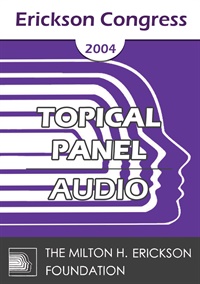
- Average Rating:
- Not yet rated
- Topic Areas:
- Topical Panels | Brief Therapy
- Categories:
- Erickson Congress | Erickson Congress 2004
- Faculty:
- Steve De Shazer, MSSW | Richard Fisch, MD | Wendel Ray, PhD | George Burns, MA, PsS
- Duration:
- 1:00:34
- Format:
- Audio Only
- Original Program Date:
- Dec 03, 2004
- Short Description:
- IC04 Topical Panel 02 - Brief Therapy - George Burns, B A . (Hons.), Steve de Shazer, M.S.S.W., Richard Fisch, M.D., Wendel Ray, Ph.D.
- Price:
- $15.00 - Base Price
Tags: Brief Therapy
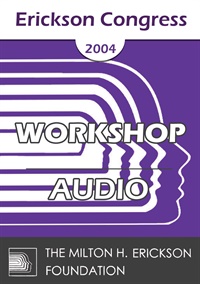
- Average Rating:
- Not yet rated
- Topic Areas:
- Workshops | Brief Therapy | Experiential Therapy
- Categories:
- Erickson Congress | Erickson Congress 2004
- Faculty:
- Lilian Borges, MA, LPC
- Duration:
- 2:07:28
- Format:
- Audio Only
- Original Program Date:
- Dec 02, 2004
- Short Description:
- Change is a result of what patients experience not merely what they understand. We will study sculpting, role-playing, utilization strategies and concrete metaphors. Experiential methods can be used in every part of the therapy including assessment, treatment and homework. Lecture and demonstration.
- Price:
- $15.00 - Base Price
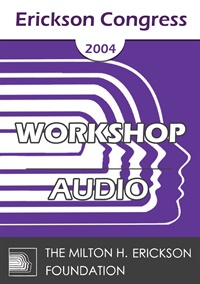
- Average Rating:
- Not yet rated
- Topic Areas:
- Workshops | Brief Therapy | Eating Disorders
- Categories:
- Erickson Congress | Erickson Congress 2004
- Faculty:
- Giorgio Nardone
- Duration:
- 1:26:05
- Format:
- Audio Only
- Original Program Date:
- Dec 05, 2004
- Short Description:
- Eating disorders are rapidly evolving towards a kind of "refined specialization." Young women with bulimic or anorexic tendencies have discovered different ways that enable them to control their weight without giving up the pleasure of eating, thus nowadays we encounter new forms of eating disorders. All these have different persisting patterns and attempted solutions. As a result, each requires a different treatment protocol.
- Price:
- $15.00 - Base Price

- Average Rating:
- Not yet rated
- Topic Areas:
- Workshops | Brief Therapy
- Categories:
- Erickson Congress | Erickson Congress 2007
- Faculty:
- Rubin Battino, MS
- Duration:
- 1:52:15
- Format:
- Audio Only
- Original Program Date:
- Dec 06, 2007
- Short Description:
- The expectation of change is central to doing Very Brief Therapy work. The theory and background of doing Very Brief Therapy will be given with many illustrations and examples. A variety of approaches for this work will be presented. The process will be illustrated with a volunteer.
- Price:
- $15.00 - Base Price
Please wait ...

